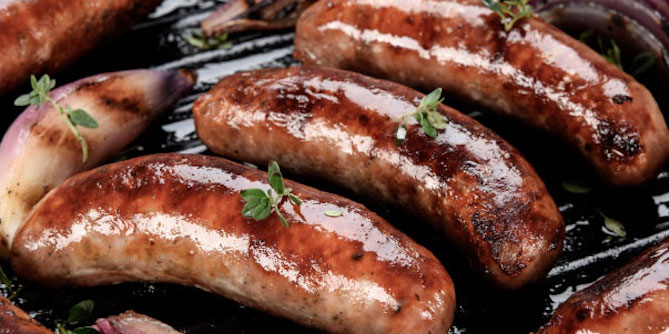Consumers will be the big losers, if the ‘sausage war’ between the UK and the EU is not quickly and sensibly resolved, according to the British Meat Processors Association (BMPA).
BMPA chief executive Nick Allen believes both sides will need to compromise on an issue that has hit the headlines this week, with crunch talks due to take place today.
The issue has arisen because the EU currently bans imports of products like sausage and mince from third countries due to safety concerns. While the UK is currently unable to export sausages or mince to the rest of the EU, the trade has continued with Northern Ireland under a grace period until the end of June set out in the Northern Ireland protocol.
However, the UK Government has proposed either extending the grace period or putting new permanent arrangements in place to allow the trade to continue, prompting an angry backlash from the EU, which has accused the UK of trying to break its obligations under international law.
Ahead of today’s talks with UK Brexit Minister David Frost, European Commission vice-president Maros Sefcovic said Brussels would ‘not be shy in reacting swiftly, firmly and resolutely to ensure that the UK abides by its international law obligations’.
He promised retaliation if the UK proceeds with its plans, which could affect trade in other food products.
Mr Frost has demanded ‘flexibility’ from the EU and warned that ‘time is short’ to get an agreement. The UK wants the EU to accept that UK production standards are broadly equivalent to the EU’s.
Defra Secretary George Eustice said there was ‘no problem with our sausages’ and insisted it was a ‘nonsense’ that the EU can’t trust any other country to make sausages.
“The issue is there is a peculiar quirk in the EU that says that sausages that are made in what they term a third country are banned from sale in the EU. Our view is that Northern Ireland is an integral part of the UK so that is not an export trade and therefore that trade should be allowed to continue.”
He urged the EU to engage constructively in the process of sorting out the ‘wrinkles in the Northern Ireland protocol’. “We have got a very good sausage industry in this country and we have got the highest standards of food hygiene in the world,” he added.
Consumer impact

Mr Allen said both sides needed to recognise the reality of the situation and its potential impact.
“From our perspective, you just wish both sides would grow up and recognise that the real loser is the consumer. All both sides are doing is building costs into the system,” he told Pig World.
He suggested the answer could lie in some sort of veterinary agreement, requiring Export Health Certificates, which would require a change in EU regulation.
“The EU could do well to consider that we are in a new situation – there has never been the need export sausages and chilled meats from a third country in close proximity before,” he said, adding that a solution would benefit both sides as the UK will eventually have to implement similar rules for EU imports when these checks finally start to apply.
“Equally, the UK Government has to respect that if they don’t want a hard border between Northern Ireland and the Republic of Ireland, they can’t expect Northern Ireland just to be a free for all, especially when they are negotiating trade deals with Australia and the US where products could end up coming here that the EU might feel differently about than we do.”
If the Northern Ireland sausage and mince trade does not continue after this month, the GB meat sector would lose fresh sales and would be forced to send more frozen products into Northern Ireland at a reduced cost.
“We can talk about how businesses would be affected, but the real loser would the consumer, who will have less choice and will be paying higher prices. This is just creating cost and inflation. I just wish both sides would put the consumer first,” Mr Allen added.
Deep concern
The issue goes to the very heart of the Brexit process, with European Commission president Ursula von der Leyen expressing ‘deep concern’ over the implementation of the Brexit deal following phone talks with Mr Johnson on Tuesday evening, the Independent reported. Downing Street has accused the EU of adopting a ‘purist’ approach.
The UK has resisted EU proposals to align food safety regulations with the EU because of fears this would block potential future trade deals with countries like the US where standards are lower. But the desire to retain free trade across the Irish border is throwing up tensions when it comes to the need for checks on trade between GB and NI, which have now come to a head over the sausage and mince trade.
A Government spokesperson said: “There is no case for preventing chilled meats from being sold in Northern Ireland – any ban would be contrary to the aims of the Protocol and the interests of the people of Northern Ireland.
“An urgent solution must be found, so that Northern Irish consumers can continue to enjoy chilled meat products they have bought from Great Britain for years. We are speaking to the EU about this issue in today’s Joint Committee.”




